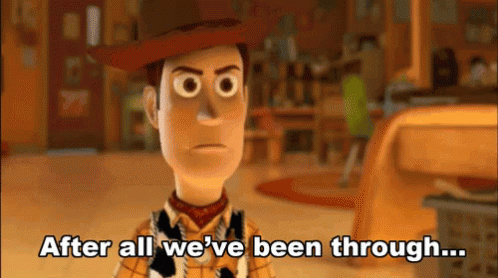Wayward Reflection (002)
Writing Down Thoughts As I Work On Wayward Betrayal For This Week
Hey there and welcome to our second reflection piece. I write to figure things out. Writing helps me see what I actually think. It forces me to turn feelings into language, and language into clarity. Most of the time, I realize I don’t know as much as I thought, and honestly I’m just learning out loud.
This Substack is my public notebook: part sketchpad, part journal. Each writing is an attempt to turn moral injury into moral leadership, and to further build onto our framework to help; while rooted in faith, discipline, and direction. This is honestly just me doing the hard work of unbecoming the person I was never meant to be, and growing into the next season of life.
If something here helps you, take it. If it doesn’t, leave it. Either way, I’m glad you’re here.
Betrayal of Self Optimization
The great thing about being a problem solver is you’re great at solving problems.
The worst thing about being a problem solver is you’re great at finding them.
Lately, through many different therapies, I’ve had to admit something uncomfortable. Really a strength I used to take pride in has also become a root cause of some of the damage I caused in my marriage.
For years, my identity was built around fixing things. Turning around teams. Making broken units work again. I’d get the awards, the coins, the “good job” write-ups, but half the time, I didn’t do anything extraordinary. I just read the right books and applied what I learned.
Rumelt’s Good Strategy Bad Strategy.
Keith Ferrazzi’s Never Eat Alone.
McChrystal’s Team of Teams.
I was good at taking other people’s wisdom, breaking it down, and turning it into systems. Understand the task. Apply the lessons. Iterate. Improve. Same thing we are trying to do with moral injury here.
It worked. Mostly.
At least on paper.
But I didn’t realize that same mindset, the relentless drive to optimize, followed me home. In marriage counseling, and through programs like Our Relationship from Military OneSource, I started seeing it for what it was. I treated my marriage like a command climate issue. I tried to fix emotions instead of feeling them. I listened to understand the problem, not the person.
One hard lesson I learned, and still learning and working on to this day is that my wife didn’t need a strategist. She needed space to just be. To vent, think, feel, exist; without me trying to “solve” or “fix” her.
I think that’s what I mean when I am writing about small betrayals of self this week. Not dramatic ones. Just the subtle ways we trade presence for performance. I’ll write more about this in Sunday’s longer piece, or whenever I get it done. It’s all about progress, not perfection.
So…betrayal?
As I continue to build out the research section of this Substack, it feels important to start with a shared understanding.
In the military and corporate worlds, that’s usually where things go wrong. We rush past definitions in our urgency to act. We assume we’re aligned when we’re not. So this is where I’m starting.
But, before I get there, while I still love the books I mentioned above, the one that hit me hardest recently was retired General Stanley McChrystal’s On Character.
There’s a passage I underlined where he is vulnerable about his greatest regret, after everything he accomplished, and it wasn’t a failed mission or a tactical mistake. It was the times he wasn’t there for the person in uniform who needed him most. Those moments when the individual met the system.
That idea gutted me. Because I’ve seen it. I’ve been on both sides of it.
And that’s the terrain where betrayal quietly begins. Not with disloyalty or malice, but with absence.
Betrayal doesn’t always mean what people assume.
It doesn’t always mean treason, or sabotage. It doesn’t always mean someone sold secrets to another company, broke ranks, or turned coat. Sometimes betrayal is quieter. More personal. It’s the moment someone stops believing that the system they served still remembers their humanity.
In the military, the fear of betrayal is almost sacred. We build entire cultures around loyalty and integrity, and for good reason. History is full of names that remind us what happens when self-preservation or ideology wins over oath. Those people were traitors, plain and simple.
But here’s the tragedy: in trying so hard to prevent betrayal, our systems often end up creating it; just in quieter ways.
The kind of betrayal I’m talking about isn’t when a person turns against the institution. It’s when the institution, often unintentionally, turns its back on the person. Or, the person turns their back on themselves.
It’s not that different from what I did in my marriage. Trying to fix problems that didn’t need solving. I still remember my wife saying, “I’m not one of your Airmen,” in a long forgotten argument; and me, in all my young brilliance, firing back, “Yeah, because if you were, I’d give you paperwork.”
Even typing that makes me cringe with a little nausea. Back then I thought I was being clever. Now I just hear the sound of someone mistaking control for care.
But, I digress.
I think we’ve grown so afraid that someone might “go rogue,” “lose it,” or “say the wrong thing” that we isolate them first. All in the name of protecting the mission. But I’ve come to believe that isolation is the betrayal, especially when it’s done to someone who genuinely cares.
Because isolation disguised as “help” doesn’t heal anything. It just breaks trust in slow motion. Not by one person, but by a system that confuses discipline with distrust.
Defining Betrayal
So…defining betrayal. At its core, the research defines betrayal is the breaking or violation of trust, loyalty, or confidence that exists between people, groups, or within oneself.
It takes many forms: personal, relational, moral, or institutional.
But always comes down to this:
a promise made, and then broken, whether spoken or implied.
a turning away from someone or something you were meant to protect.
Three layers of meaning:
Relational Betrayal: when someone close (a friend, spouse, or teammate) acts against shared trust or values.
Moral Betrayal: when your own actions, or those of a trusted system, violate your deepest sense of right and wrong, leading to moral injury.
Self-Betrayal: when you act against your conscience, values, or integrity; often to please, conform, or avoid pain.
In essence, betrayal is the fracture of faith between what was expected and what was done. It is a breaking of trust. This differs from injustice; which is a denial of fairness, equity, or moral rightness.
What Hurts The Most
What hurts the most for the wayward individual is when people call it “perceived.”
This is where it gets complicated, where I need to do more research, and where Sunday’s essay will pick up.
When someone, especially in a clinical or institutional setting says, “you have a perceived sense of betrayal or injustice,” it sounds neutral on paper. But to the person living it, it feels like gaslight dressed in professionalism. Almost like your reality has been quietly downgraded to interpretation.
It’s a subtle shift, but it cuts deep. That’s the moment when a soul wound gets relabeled as a behavioral concern, and for someone already carrying untreated trauma, or trying to navigate a neurodivergent mind without a solid center, that spiral can take you under fast.
That’s where we tend to see where moral injury begins: when systems try to fix the person instead of mending the breach that broke them.
If you have ever noticed what others won’t.
Feel the dissonance between what’s preached and what’s practiced.
Or you speak up, thinking you’re helping;
But in a world obsessed with order, even clarity can sound like dissent.
So you start to edit yourself.
You stay quiet because silence keeps the peace.
And somewhere in that silence, you start to lose pieces of yourself.
That’s the hidden cost of loyalty in a system afraid of betrayal: you start betraying yourself first, just to prove you won’t betray anyone else. A slow corrosion of trust that makes you feel like strangers in your own circles.
That same corrosion lives in moral injury and suicide. The research is starting to show that both (moral injury and suicide) grow from the belief that you’ve become your own enemy, or that the system has no place for your pain, so the only option left is exile.
Faith & Sunday’s Deep Dive
I’m not claiming to have it all figured out, but the work (the discipline, the searching, the direction) I am putting in keeps leading me toward faith, and a more honest and personal relationship with God.
Lately, I keep coming back to Proverbs 16:9 and it’s strange how that verse hits differently when life doesn’t look like the plan I planned out. I’ve mapped out missions, careers, relationships all with the illusion of control, and still found myself standing in places I never meant to be. Now, I’m starting to wonder if maybe that’s where the real alignment happens. Maybe the terrain that feels like betrayal is the same ground where something better is being rebuilt.
I don’t pretend to know what the next step looks like. But I’m learning to trust that even in the wandering, the steps are still being established; just not by me.
As we continue to study moral injury and betrayal, it seems it isn’t just when you notice the cracks. But, it’s when you stop believing they can be healed.
It’s when you let bitterness convince you that truth no longer matters and that hardening is safer than hoping.
Betrayal, at its core, is the fracture of faith. The quiet shattering between what was expected and what was done.
When institutions, leaders, or even our own choices deny that fracture, the wound deepens.
That’s where moral injury takes root. Not because a rule was broken, but because something sacred between people was, and no one named it.
So before we rush to fix, diagnose, or “perceive,” maybe we pause long enough to define.
To remember that betrayal isn’t just what others do to us, but it’s what happens in the space between trust and truth.
If this quick thought piece laid the groundwork and language for what you have only felt; then stay tuned for Sunday’s essay. It will go deeper into all of this and speak more to what happens when the person meets the system, when self-trust begins to erode, and when faith somehow finds its footing again.
Feel free to comment, share, or just show up again Sunday.
We’ll keep working through what it means to turn moral injury into moral leadership; through faith, discipline, and direction. Little by little, we’re learning to change the mindset so that despair never gets the final word, and suicide is never the option.






